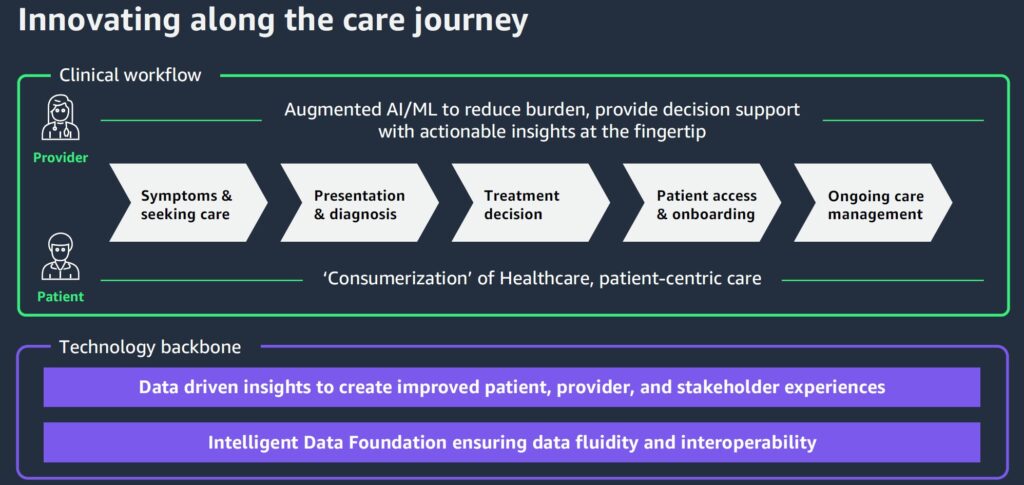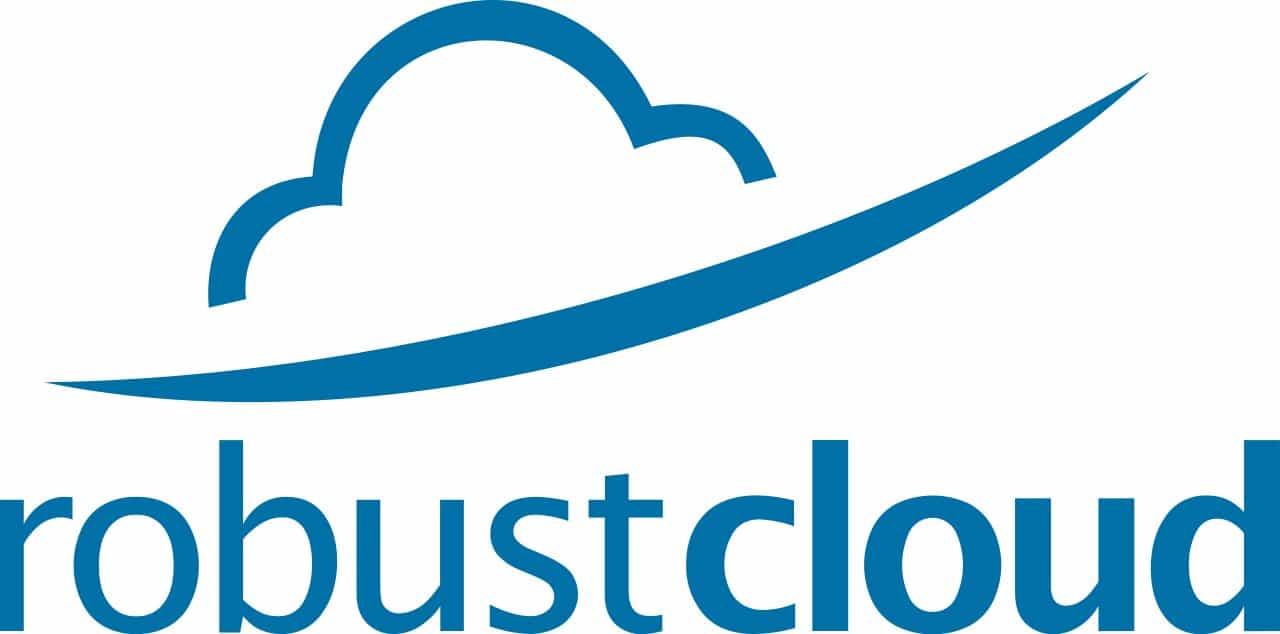Introduction: AWS recently hosted its first summit focused on the healthcare and life sciences (HCLS) industry, inviting a select group of industry analysts. The summit highlighted the importance of understanding the unique value delivered by AWS to address the specific needs of the healthcare and life sciences industry. AWS positioned itself as a transformative force in the HCLS industry by showcasing how customers can apply AWS services to this domain. High-quality, accurate, relevant, and timely data is critical for innovation in the AI age. The company’s central theme was enabling innovation through data-driven insights (see Figure 1 below). Connected to AI solutions, the other two themes were advancing generative AI for improved patient care and ensuring responsible AI deployment. This blog post delves into these themes, shedding light on AWS’s industry initiatives and their potential impact on the healthcare and life sciences sectors.

Enabling Innovation Through Data-Driven Insights
AWS’s healthcare and life sciences strategy is rooted in the belief that data is the cornerstone of innovation. One set of AWS efforts focuses on unifying and harnessing vast amounts of healthcare data to drive improved patient outcomes and operational efficiencies. Below are some ways of delivering data-driven benefits:
1. Unified Data Platforms:
Every organization has various data available from internal and external sources in varying formats. AWS offers solutions for breaking down data silos, allowing seamless integration and analysis of diverse data sources. For example, AWS HealthLake aggregates structured and unstructured health data, empowering healthcare providers to gain actionable insights. By converting data into a unified, searchable format, AWS enables healthcare organizations to harness the potential of their data, fostering innovation in patient care and research.
2. Enhanced Patient and Provider Experiences:
Patient experience in healthcare settings is based on a standard protocol without discerning differences in each patient. Physicians could deliver much better care with insight into all the data available in near real-time. Within a clinical workflow, AWS has the data management elements to support the delivery of actionable insights to the provider while improving the healthcare experience for patients. This infrastructure meets the operational needs of healthcare systems by focusing on individual patients. Unified data facilitates improved outcomes, lowers costs, and provides innovative therapeutic solutions.
For this use case, one success story shared at the summit was the partnership between Philips and AWS. Both companies expanded their collaboration to enhance digital pathology through cloud technology. This partnership combines Philips’ expertise in clinical workflows with AWS’s cloud solutions to improve diagnostic capabilities and productivity. With the security and scalability of cloud technology, pathology labs can efficiently manage and analyze large volumes of digital pathology data, integrate AI for better insights, and facilitate seamless collaboration among specialists. The goal is to improve patient care by optimizing workflow efficiency and enabling more precise and timely diagnoses.
3. Research and Development in Life Sciences:
The amount of data available from past research is increasingly challenging the possibility of a new drug being easily discovered to address specific health issues. Made-for-purpose silicon accelerates the analysis of data to help scientists process large amounts of data, giving them better insight while developing new drugs. Generative AI speeds up research and discovery processes by helping to optimize clinical trial protocols, predict patient outcomes, and design proteins. This enhances the efficiency and effectiveness of research initiatives. AWS’s infrastructure, including custom silicon, supports continuous experimentation and integration of third-party generative AI solutions, fostering a culture of innovation.
AWS also offers data capabilities in life sciences, covering genomics, clinical trials, and drug discovery. Omics data encompasses comprehensive datasets from various biological levels, such as genomes, proteomes, and metabolomes, providing insights into genetic, protein, and metabolic functions within biological systems. Services like AWS Health Omics transform genomic and other omics data into valuable insights, speeding up research and development. This is especially important in precision medicine, where data-driven approaches can result in more effective and targeted treatments.
Advancing Generative AI for Enhanced Patient Care
Generative AI significantly advances healthcare innovation, and AWS strives to lead this transformation. The company’s generative AI stack, a unique amalgamation of Amazon Bedrock and diverse foundation models, offers unique capabilities for the HCLS industry.
Here are some critical characteristics of AWS’s Gen AI capabilities:
1. Diverse AI Models and Customization:
With the advent of Gen AI, many models have emerged, each with its strengths and weaknesses. This variety allows customers to select models that align with their business needs. AWS offers diverse AI models through Amazon Bedrock, including Anthropic’s Claude, Meta’s Llama, and Amazon’s Titan, all of which can be customized using organizational data. This adaptability empowers healthcare providers to choose and customize models most effective for clinical decision support, patient engagement, or operational tasks, enhancing patient care.
2. Clinical and Operational Applications:
Currently, Gen AI is mainly used to automate repetitive tasks. The healthcare industry is burdened with many regulations, and healthcare workers face many repetitive tasks required for compliance. As a result, Gen AI applications have a wide range of uses in healthcare. For example, AWS HealthScribe can automatically generate clinical notes from patient-clinician conversations, significantly reducing the administrative burden on healthcare professionals.
Ensuring Responsible AI Deployment
As AI becomes increasingly integral to healthcare and life sciences, AWS emphasizes the importance of responsible AI deployment. This commitment is reflected in the company’s framework for ensuring ethical and secure AI usage. AWS shared the following aspects of responsible AI deployment:
1. Ethical AI Practices:
Recent lapses in AI deployments that caused racist and derogatory chatbot responses have brought ethical issues to the top of customer priorities. AWS prioritizes the ethical use of AI by incorporating mechanisms to monitor and steer AI system behavior. The approach includes evaluating and mitigating potential biases, ensuring the accuracy and fairness of AI outputs, and protecting sensitive data. For example, Amazon Bedrock includes guardrails to filter harmful content and block undesirable topics, ensuring partner or customer AI applications adhere to ethical standards.
2. Compliance and Security:
Some AI companies are facing lawsuits as they use data owned by other entities without due compensation. The risk has made customers cautious about their data becoming publicly available when using publicly available AI solutions. AWS offers solutions for regulatory requirements such as HIPAA, GDPR, and SOC to address the confidentiality of healthcare data. The company’s focus on security and privacy ensures that healthcare organizations can trust AWS to provide secure infrastructure to protect their data, knowing that industry-leading safeguards protect it. AWS’s standard compliance underscores its commitment to providing safe, trustworthy AI solutions.
3. Customer Empowerment:
Public AI models shot up in popularity with consumer-facing solutions but lacked transparency on the data used for training. Many hiccups are faced during AI solution deployment. One example is the Air Canada customer chatbot, which provided incorrect guidance to customers. As a result, customers embarking on AI solution deployment expect visibility on the end-to-end processes. AWS enables customers to make informed decisions about their engagement with AI systems. The visibility involves transparency around AI model evaluations and ensuring organizations can customize models to fit their unique requirements. By doing so, AWS fosters a collaborative environment where stakeholders can actively participate in developing and deploying AI solutions.
Conclusion
The AWS Healthcare and Life Sciences Summit underscored the company’s role in driving innovation with industry partners and customers through its comprehensive cloud solutions. By focusing on data-driven insights, AWS aims to break down data silos and enable healthcare organizations to harness the full potential of their data, leading to improved patient outcomes and operational efficiencies. The advancements in generative AI showcased by AWS, including diverse AI models and applications in clinical settings, highlight the transformative potential of AI in enhancing patient care. Moreover, AWS’s commitment to responsible AI deployment ensures that ethical considerations and robust security measures are integral to its solutions, fostering customer trust and reliability.
As the healthcare and life sciences sectors evolve, AWS’s strategic initiatives and innovative technologies position it as a critical enabler of progress. Industry-appropriate messaging by AWS will improve HCLS customers’ ability to map technology value to business outcomes. The summit highlighted AWS’s current capabilities and provided a glimpse into the future of healthcare, where data and AI play central roles in driving meaningful change.
